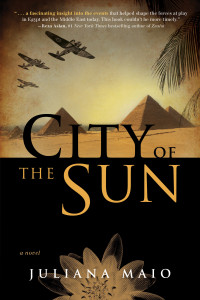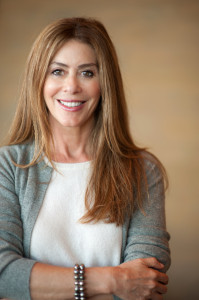A Great Passion, A Great Story
MARK EVANS
 Juliana Maio had a passion to tell a story. “I wanted,” she told me, “to write an entertaining and informative novel about a special time and place.” Maio was determined that people should know “that there was once a beautiful and colourful Jewish community in Egypt.” That is, before it was expelled in the 1950s as a result of the festering Arab-Israeli conflict.
Juliana Maio had a passion to tell a story. “I wanted,” she told me, “to write an entertaining and informative novel about a special time and place.” Maio was determined that people should know “that there was once a beautiful and colourful Jewish community in Egypt.” That is, before it was expelled in the 1950s as a result of the festering Arab-Israeli conflict.
In City of the Sun she has succeeded. Ostensibly the story is about a cross-cultural romance between Mickey, an American journalist, and Maya, a German-Jewish refugee, but there is a lot more to it than that. It is set in Cairo in 1941 when Axis forces are approaching Egypt through Libya and the city is a hotbed of intrigue. The ruling British, Germans, Italians, Americans, Egyptian nationalists and Zionists are all vying for influence, and spying is rife. The city’s Jewish community lives peaceably alongside Arabs, Africans and Europeans, and worships amongst Muslims, Christians and secularists, but increasingly it is caught up in the tangled webs everyone is weaving.
There is a lot of Maio in the story. She left Egypt, the land of her birth, when she was just three years old, expelled with her family during the Suez crisis in 1956. “As a refugee and then as an immigrant myself who was uprooted twice, I could easily draw from my personal experiences when writing the novel,” she says. “Granted we did not flee from Hitler’s internment camps like Maya and her family, but we went through similar trauma of loss and fear for the future when we were chased out of Egypt and arrived in France, in a new culture, without knowing a soul, stripped of all of our possessions and miles away from our loved ones.”
When she was seventeen, Maio moved from France to the United States, where she graduated from school and now lives. An entertainment lawyer and co-founder of an independent film and television company, she is successful and settled, And yet she said in an interview for Levantine TV, “I always wondered about my roots. I was born in Egypt yet I was not Egyptian.” Her parents and grandparents also were born in Egypt. Her father’s native language was Italian and he had Italian citizenship “yet,” she puzzles, “he was not Italian. My mother had French citizenship, yet she was not French. So I wondered, ‘what was my family doing there?’ ” She was driven to find out and “….fell in love with everything I discovered and I had to write this book.” She did not find it an easy task, “….the research for this book was daunting.…” but found that “….as I wrapped my arms around the world of my novel, I became so immersed that the book started to write itself with history filling in the blanks.” 
She carried out extensive research and wrote ten drafts. “The first one was a thousand pages long,” she confesses, “and included the point of view of many of the characters now only briefly appearing in the novel, such as the British Ambassador, young King Farouk, and Egypt’s then prime minister. I wanted to give voice to all of them; they all had a story to tell, but with each draft, as a trimmed the text, I had to let go of a character’s point of view.”
Maio’s great passion for the vibrant culture of her family and people and for their rich history vividly colours the tapestry she weaves in City of the Sun. “To me,” she professed at a Hollywood book signing last year, “the most important thing is that I discovered my roots and I came to terms [with the fact that] part of me is culturally Arabic.”
City of the Sun is about history, but Maio is convinced that the history is not dead and buried. “Today there are forty Jews living in Egypt, mostly elderly women. Most Egyptians under the age of fifty are not even aware that not so long ago, a large colony of Jews lived side by side with them in harmony, and even fought side by side with them for an independent Egypt. Jews founded and financed many of the country’s finest hospitals and institutions. There is no future for the Jews in Egypt right now, but Egyptians are a warm and welcoming people and I believe that should the Israeli-Palestinian problem be solved, we will be breaking bread with them again.”
About the contributor: Mark Evans is passionate about writing and loves history. He wrote his first novel when he was fifteen years old and has been writing ever since: novels, scripts, articles for journals, magazines and websites and on the back of napkins. He has been an astronomer, a defence analyst, a public affairs and marketing consultant, a business advisor, a politician, a guest house owner: but always a writer.






